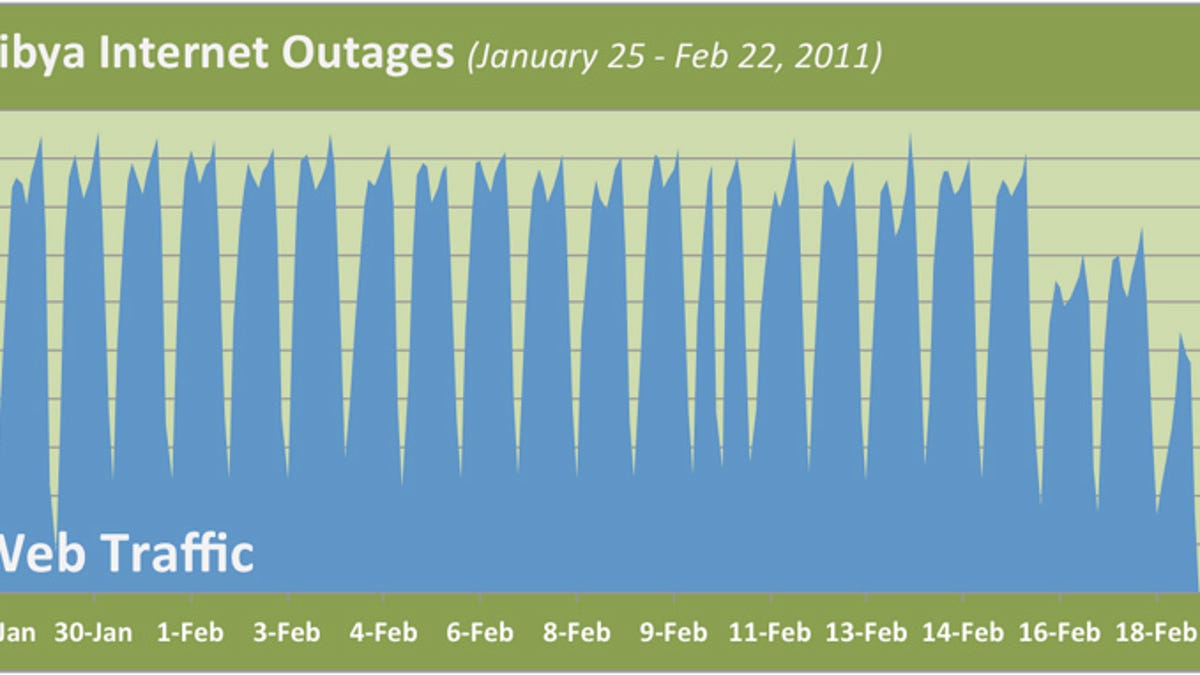Libya's Internet hit with severe disruptions
Libya's network traffic has fallen by up to 80 percent, with YouTube being especially hard hit, as the country appears to follow Egypt's recent example.
Libya's Internet links have been severely disrupted as chaos spreads across the country, with a defiant Col. Moammar Gadhafi today vowing to die a "martyr" rather than relinquish his grip on power.
As reports describe portions of Libya as a "war zone," and the country's deputy U.N. ambassador is saying "genocide" is under way, inbound and outbound Internet traffic has plummeted to a fraction of what's normal. Over the weekend, traffic appeared to be following a "curfew" pattern, with more restrictions imposed in the evenings, and YouTube is now almost entirely unreachable while Facebook is blocked.
Craig Labovitz, the chief scientist of Arbor Networks, said that as of today, Libya is experiencing a significant Internet outage with traffic volumes 60 percent to 80 percent below normal levels.
That follows a complete outage on Friday night, with the country vanishing from the Internet as completely as Egypt did during its revolts a few weeks earlier. Partial service was restored Saturday morning, only to be cut off again at around 2 p.m. PT, or midnight local time.
Jim Cowie, co-founder and chief technology officer of Internet intelligence firm Renesys, says it's not clear whether the disruptions are intentional or caused by other factors such as power outages. (A report by a CNN correspondent in eastern Libya said the power was up but the Internet was down.)
"The outages have lasted hours, and then service has resumed," Cowie said. "All of that is consistent with alternative explanations, such as power problems or some other kind of single-operator engineering issue."
Egypt's Internet disruptions were easier to identify because of the larger number of broadband providers, almost all of which went dark simultaneously. In Libya, however, there appears to be only one with connections to the rest of the world: Libya Telecom and Technology, which is state-owned and enjoys close ties to Gadhafi.
Egyptian networks "were withdrawn within the same 20-minute window--hundreds and hundreds of networks were affected, and stayed down for days," Cowie said. "Traffic flowing through Egypt to other destinations in the Middle East was utterly unaffected. All of that gave a fairly unambiguous signal from the start that it was a political event."
Graphs from Google's Transparency Report and Akamai Technologies reflect the hiccups in Libya. The data shows daily rises and dips in normal Internet traffic from Libya, followed by a stuttering, interrupted flow after Friday. Traffic appeared to be rising on Tuesday, but at far lower levels than a week before.
YouTube's traffic volume, according to the Transparency Report, is down as much as 90 percent from normal levels.
Instant messaging and Web browsing traffic has dropped more quickly than other types, according to Arbor's Labovitz.
While Libya's government has engaged in relatively modest Internet selective filtering in the past, the list of off-limits Web sites has grown in the last week.
The AFP news service reported on Friday that Facebook was blocked, and Al Jazeera's Web site is now off-limits. Al Jazeera said today that it's "suffering interference on its Arabsat satellite frequency" as well.
That follows Gadhafi's recent warning to Libyans not to use Facebook, where activists have created groups calling for reform.
Bit.ly CEO John Borthwick wrote on Quora that Internet blocking in Libya "will not affect" his company's site because some of the root nameservers for the .ly top-level domain are located in Oregon and the Netherlands. Page.ly's Joshua Strebel offered similar assurances.
On the other hand, if for some reason Libya's government decided to target foreign .ly Web sites--which of course wouldn't make much economic sense--it could require that those domains be removed from the master in-country registry. They would then begin to disappear from the Internet over the next few weeks.


